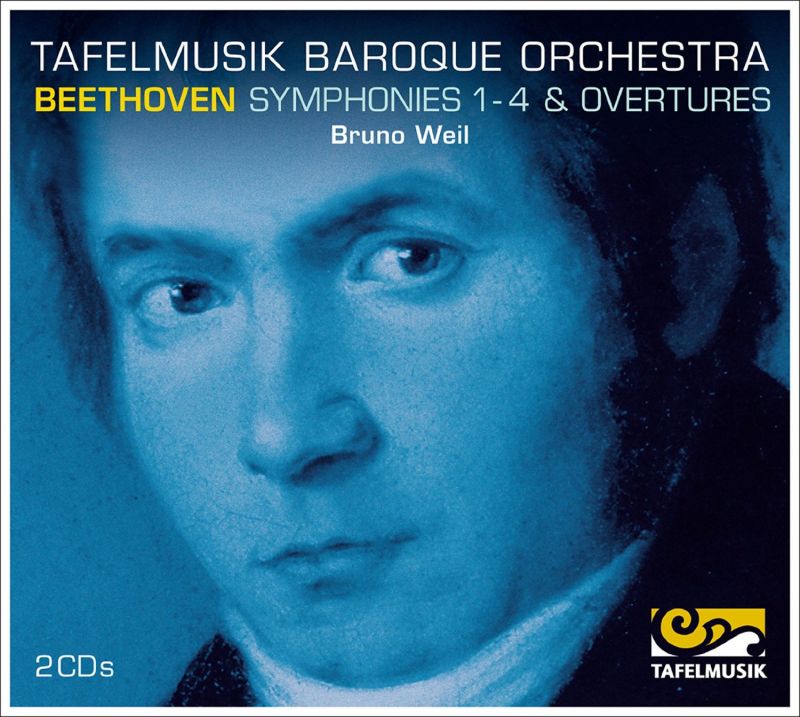BEETHOVEN Symphonies 1 - 4
View record and artist detailsRecord and Artist Details
Composer or Director: Ludwig van Beethoven
Genre:
Orchestral
Label: Tafelmusik
Magazine Review Date: 08/2014
Media Format: CD or Download
Media Runtime: 151
Mastering:
DDD
Catalogue Number: TMK1023CD2

Tracks:
| Composition | Artist Credit |
|---|---|
| (Die) Geschöpfe des Prometheus, '(The) Creatures of Prometheus', Movement: Overture |
Ludwig van Beethoven, Composer
Bruno Weil, Conductor Ludwig van Beethoven, Composer Tafelmusik Baroque Orchestra |
| Symphony No. 1 |
Ludwig van Beethoven, Composer
Bruno Weil, Conductor Ludwig van Beethoven, Composer Tafelmusik Baroque Orchestra |
| Symphony No. 3, 'Eroica' |
Ludwig van Beethoven, Composer
Bruno Weil, Conductor Ludwig van Beethoven, Composer Tafelmusik Baroque Orchestra |
| Symphony No. 2 |
Ludwig van Beethoven, Composer
Bruno Weil, Conductor Ludwig van Beethoven, Composer Tafelmusik Baroque Orchestra |
| Symphony No. 4 |
Ludwig van Beethoven, Composer
Bruno Weil, Conductor Ludwig van Beethoven, Composer Tafelmusik Baroque Orchestra |
| Coriolan |
Ludwig van Beethoven, Composer
Bruno Weil, Conductor Ludwig van Beethoven, Composer Tafelmusik Baroque Orchestra |
Author: Rob Cowan
The pizzicato strings and woodwinds that open the First Symphony also benefit from Bruno Weil’s refusal to overstate the musical case, with pointed dialogue between winds and strings once the main Allegro gets going. Here accents are more forceful, especially towards the end of the first movement’s exposition, but never forceful enough to compromise the work’s Haydnesque character. After a bracing scherzo (‘Menuetto’), the timpani player marks a stern opening for the finale’s initial Adagio, before the Allegro flies off at a real lick. A very good First, then, vigorously played and thoughtfully balanced.
The more imposing Second Symphony isn’t quite so successful. The opening is poised but prosaic, capturing little of the work’s furrowed sense of purpose. Turn to Frans Brüggen’s latest recording with the Orchestra of the Eighteenth Century and the contrast is striking, bland pastel shades as opposed to big, sombre sonorities stylistically reminiscent of Furtwängler – though not specifically Furtwängler’s dreadful-sounding radio relay of the same work. At 8'02" into the first movement’s development section you hardly hear the horns, and the big, brass-topped build-up around the coda wants for impact. Skrowaczewski and Scherchen tell a quite different story, far more gripping. The tortured heights of the Larghetto are also underwhelming, and Weil levels the two chords that push the Scherzo’s Trio towards its close, ignoring the sforzando that’s marked under the second of them (compare Skrowaczewski or Abbado in Berlin).
As to the Fourth, Weil balances the slow introduction well, keeping the bass-line clear. Gardiner is similarly transparent, though in Weil’s hands the Allegro vivace that leaps from it is unexceptional. The fast-lane finale is well played though the bubbly clarinet that busies around the second subject is barely audible. Zinman in Zurich is far stronger on clarity here.
When the oboe leads the second subject of the Eroica’s ‘Marcia funebre’, Zinman generates far more tension, his approach, though swift, a credible mirror of a solemn, even defiant processional. His climaxes are tautly sprung, much as Gardiner’s are, whereas Weil is relatively soft-grained. Much the same applies to the first movement, so different to Gardiner’s post Toscanini blitzkrieg and the broader, mellower manner of Brüggen. I could go on, but I’d be wasting words. Weil’s Beethoven is for the most part considered, generally well played and up to speed with modern scholarship but it lacks individuality. Best by far are the two overtures and the First Symphony, and one hopes that a second volume will feature performances that are as good, if not better.
Explore the world’s largest classical music catalogue on Apple Music Classical.
Included with an Apple Music subscription. Download now.

Gramophone Digital Club
- Digital Edition
- Digital Archive
- Reviews Database
- Events & Offers
From £9.20 / month
Subscribe
Gramophone Club
- Print Edition
- Digital Edition
- Digital Archive
- Reviews Database
- Events & Offers
From £11.45 / month
Subscribe
If you are a library, university or other organisation that would be interested in an institutional subscription to Gramophone please click here for further information.






